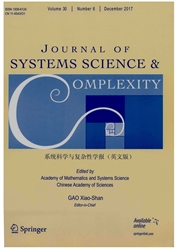

 中文摘要:
中文摘要:
这份报纸学习缩放与一个二水平的供应链问题有关仔细与是的早和缓慢惩罚安排问题的批。处于这个问题,有 K 顾客订单,在由一些联合起来的长度工作组成的每份顾客订单有一个到期的日期的地方。这些工作在一台普通机器被处理然后在批送到他们的顾客,在每批的尺寸让上面、更低的界限和每批可以招致罐头也被认为固定交货费用的固定安装费用的地方。目标是发现最小化早和缓慢费用的和的一张时间表,安装费用由创造新批招致。作者首先与另外的假设(a) 为单个顺序的问题介绍最佳的时间表的一些结构的性质:这些工作连续地从时间零被处理。把性质基于这些,作者与假设(a) 为单个顺序的问题给一个多项式时间算法。然后,作者与假设(a) 为多重顺序的问题的一些特殊情况给动态编程算法。最后,在场的作者为没有假设(a) 的单个顺序的问题的最佳的时间表的一些结构的性质并且为它给一个多项式时间算法。
 英文摘要:
英文摘要:
This paper studies the batch sizing scheduling problem with earliness and tardiness penal- ties which is closely related to a two-level supply chain problem. In the problem, there are K customer orders, where each customer order consisting of some unit length jobs has a due date. The jobs are processed in a common machine and then delivered to their customers in batches, where the size of each batch has upper and lower bounds and each batch may incur a fixed setup cost which can also be considered a fixed delivery cost. The goal is to find a schedule which minimizes the sum of the earliness and tardiness costs and the setup costs incurred by creating a new batch. The authors first present some structural properties of the optimal schedules for single-order problem with an additional assumption (a): The jobs are consecutively processed from time zero. Based on these properties, the authors give a polynomial-time algorithm for single-order problem with Assumption (a). Then the authors give dynamic programming algorithms for some special cases of multiple-order problem with Assumption (a). At last, the authors present some structural properties of the optimal schedules for single-order problem without Assumption (a) and give a polynomial-time algorithm for it.
 同期刊论文项目
同期刊论文项目
 同项目期刊论文
同项目期刊论文
 Single machine group scheduling with processing times dependent on position, starting time and allot
Single machine group scheduling with processing times dependent on position, starting time and allot 期刊信息
期刊信息
